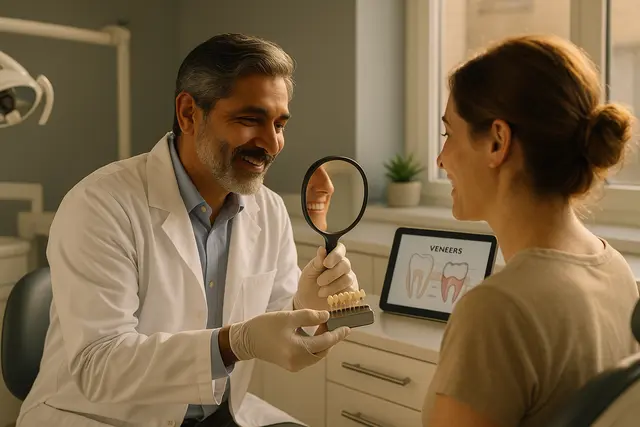Cosmetic Dentistry
4 min read
Mar 21, 2025
How to Choose a Veneer Dentist: 10 Red Flags to Avoid
Getting veneers is a big deal. It's not like picking out a new lipstick or trying a different haircut, this is your smile we're talking about. And while the idea of a perfect, glowing grin is exciting, choosing the wrong veneer dentist can turn that dream into a serious headache. Let’s walk through the biggest red flags to watch for when searching for the right veneer dentist, so you end up with results you love (and a smile that actually feels like yours).

1. The Dentist Tries to Rush You Into Veneers
If you walk into a cosmetic dental consultation and the dentist starts talking about veneer procedures before even asking you what you want, that’s a problem. A good veneer dentist will ask questions, evaluate the health of your teeth, talk through other options like teeth whitening or resin bonding, and help you figure out if you’re even a good candidate for veneers. You should feel like you’re being heard, not herded.
2. No Photos of Their Work? That’s a Huge Nope
Would you hire a tattoo artist who can’t show you a single piece of art they’ve done? Same idea. The best cosmetic dentists will gladly show you before-and-after photos of real patients they’ve worked on. It’s not just about seeing that they’re good, it helps you get a feel for their aesthetic. Do their veneers look natural? Are they the kind of results you’d want for yourself? This is about finding the right fit, not just someone with a license.
3. They Don’t Specialize in Cosmetic Dentistry
Just because someone is a licensed dentist doesn’t mean they’re the best cosmetic dentist for your smile makeover. Veneers require a different kind of skill, and ideally, your veneer dentist should have specific training in cosmetic dentistry. Look for someone who has taken continuing education courses, is a member of the American Academy of Cosmetic Dentistry, and actually enjoys this kind of work. You want someone who knows what they’re doing and cares about doing it well.
4. Only One Veneer Option? That’s Sketchy
Porcelain veneers are one of the most popular types of dental veneers, but they’re not the only option. A legit cosmetic dentist should talk to you about different types of dental veneers, resin, porcelain, no-prep styles, and help you choose what works best for your goals and budget. If they push one kind without explaining the pros and cons of each, it’s probably more about their bottom line than your smile.
5. They Don’t Talk About How Much Tooth Will Be Removed
One of the biggest things to understand about veneers? Your dentist might need to file down a bit of your natural teeth to make room for the new ones. If they don’t mention that, or if they make it sound like no big deal without explaining it fully, be wary. You should know exactly what’s happening to your teeth before committing to anything permanent. Transparency is everything.
6. No Try-In or Temporary Veneers
Imagine getting a brand-new smile without seeing what it looks like first. Terrifying, right? A trustworthy veneer dentist will offer a “try-in” phase or at least show you a digital preview of the tooth shape and color before placing the final veneers. You deserve to feel 100% confident before anything becomes permanent.
7. Their Office Feels Stuck in 2003
We’re not saying they need to have robots handing out lattes, but if the equipment looks dusty and the vibe is outdated, it could be a reflection of the care you’ll receive. Modern cosmetic dental procedures rely on up-to-date tools and digital design systems. And if the staff seems scattered or confused? That’s another warning sign. A veneer treatment is too important to trust to a team that’s not on top of their game.
8. They Avoid Talking About Cost or Payment Options
Veneers aren’t cheap. But the cost of porcelain and the overall price of veneer procedures should be clearly explained up front. If you’re met with vague answers or dodged questions when you bring up cost or financing, that’s a red flag. The right veneer dentist will give you a clear breakdown of pricing and help you find a solution that works within your budget.
9. They Don’t Ask About What You Actually Want
Some dentists get so caught up in the cosmetic dental procedures they do every day, they forget to stop and ask the most important question: What are you hoping for? The best cosmetic dentists want to know your goals, whether you’re after a subtle fix, want to go two shades lighter, or need a complete smile makeover. If they don’t ask what you want, how can they possibly give you the smile you’ve always dreamed of?
10. There’s No Talk About Long-Term Dental Care
Sure, veneers can look amazing. But what happens after they’re placed? A great dentist will teach you how to care for them, talk to you about how veneers may wear over time, and make sure you know how to maintain both your new smile and your dental health. If they don’t mention follow-up care or how long your veneers are expected to last, it shows a lack of commitment to your results.
Final Thoughts
Here’s the truth: choosing the right veneer dentist isn’t just about their smile gallery or how many followers they have on Instagram. It’s about their attention to detail, their communication, and whether they make you feel like a partner, not a customer.
So if you’re serious about finding the best cosmetic experience, look for a dentist who takes the time to listen, who knows the veneer process inside and out, and who treats your smile like a work of art. The right veneer dentist will help you choose the right shape, color, and type of dental veneer that flatters your features and fits your life.
Whether you're working with a cosmetic dentist in Phoenix or browsing options online, make sure you're not just chasing the most popular name, you're choosing the perfect partner to transform your smile, your confidence, and your reflection.
Your new smile deserves nothing less.
What Are Signs That a Veneer Dentist Might Not Be Trustworthy?
If a dentist rushes you into veneers without discussing your goals, skips over alternative treatments, or fails to explain the procedure clearly, that’s a red flag. A trustworthy veneer dentist should take time to assess your needs, walk you through options, and answer every question thoroughly.
Should My Veneer Dentist Show Before-And-After Photos?
Yes, absolutely. A qualified cosmetic dentist should have a portfolio of real patients that showcases their work. These photos help you evaluate their aesthetic style and determine if their results align with the smile you're hoping to achieve.
Is It Important That My Dentist Specializes in Cosmetic Dentistry?
Yes, it’s very important. Cosmetic procedures like veneers require specific training and experience. Look for someone with a background in cosmetic dentistry, who has taken advanced courses or is part of organizations like the American Academy of Cosmetic Dentistry.
What Should I Expect During a Proper Veneer Consultation?
A thorough veneer consultation should include a discussion of your goals, an examination of your dental health, a review of veneer types, and a clear explanation of the process, including how much tooth will be removed. You should also see previews or mockups before anything becomes permanent.
Read Next
Related Posts

Cosmetic Dentistry
Looking for a Dentist Who Whitens Teeth? Here’s What to Know First
A brighter smile can do wonders for your confidence, but finding the right dentist who whitens teeth takes more than just a quick Google search. From treatment options to experience and safety measures, there are a few key things you should know before booking that whitening appointment.
3 min read
Sep 10, 2025

Cosmetic Dentistry
What Type of Dentist Does Veneers? Here’s Who to Trust With Your Teeth
Dreaming of a flawless, photo-ready smile? Veneers can be a game-changer, but only if you choose the right expert to apply them. Understanding who’s qualified to handle this cosmetic procedure is key to getting results that look natural and last for years.
5 min read
Sep 08, 2025

Cosmetic Dentistry
Cosmetic Dentistry and Implants: How They Work Together
A confident smile can do wonders for your self-esteem, and modern dentistry offers more ways than ever to achieve it. Whether you're dealing with missing teeth or simply want a brighter, more balanced look, cosmetic dentistry and dental implants provide powerful solutions that work hand-in-hand to restore both function and aesthetics.
5 min read
Sep 05, 2025
Don’t have time to research every dentist around you?
See why 30k+ patients trusted us